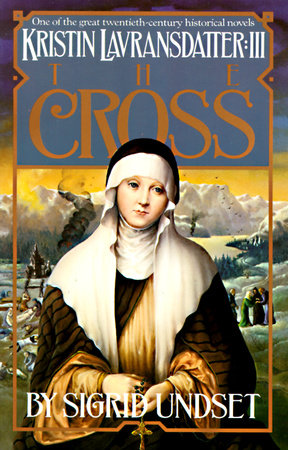The changeless roar of the falls went quivering through her overwrought body and soul. It minded and minded her of somewhat--of a time endlessly long since--even then she had known that she could not bear the lot she had chosen for herself. She had laid open her shielded, tender girlhood's life to ravaging, fleshly love--in dread, in dread she had lived ever since, a bondswoman from the first hour of her motherhood. To the world she had given herself up in her youth, and the more she struggled and fluttered in the world's snare, the more straitly she found herself bound and prisoned by the world.
I began the third book in Sigrid Undset's novels about medieval Norway, The Cross--my Christmas tradition for the past few years--utterly confused. I did not remember at all who these people were. Who is Gunnulf? What is an Arngjerd? It didn't help that Kristin Lavransdatter, in the second book, bore seven sons, several of which are given other characters' names. But by the end of it, I was convinced that this is the best book of the three.
The Wreath tells the story of Kristin's youth and engagement to the impetuous Erlend Nikulausson; The Mistress of Husaby--called in more modern translations, simply, Housewife--the story of her troubled marriage and Erlend's eventual fall from political grace. When that novel ends, the disgraced Erlend must move into Kristin's family estate, Jorundgaard, having sacrificed Husaby to the crown. The Cross is the story of Kristin's middle age, struggling to raise her sons in obscurity and ignominy alongside the still-unreliable Erlend.
The Cross depicts a woman still living under the weight of her original sin: her dalliance with Erlend in disobedience of her father, who had arranged for her to marry the gentle, reliable Simon Andresson. To modern American readers, Kristin Lavransdatter might seem tedious: isn't it time for everyone to just get over it? But God doesn't "get over" things, and while the various priests who pop up in Kristin's life from time to time chastise her for her faithlessness in holding onto her sin quite so strongly, Undset seems to understand that our gravest misdeeds do have the power to reshape our lives in ways that do not vanish. Though Erlend has given Kristin these sons, their marriage has led directly to a life on the margins of Norwegian society. Both Erlend and Ramborg, Kristin's sister and Ramborg's now-husband, perceive that Simon is still desperately in love with Kristin, and so the novel opens with Kristin's alienation from one of the few friends who remained steadfast through Erlend's downfall. Things only get worse when Erlend, aggrieved at Kristin's long-simmering feelings of regret, separates from her and goes to live on his own.
The Cross is full of moments of high drama, which I feel reluctant to spoil, but which are key to understanding why the book is so compelling, so consider yourself warned. First, Simon dies tragically without ever having told Kristin how he feels. Kristin goes to visit Erlend, and while their tryst fails to reunite them, it does lead Kristin to conceive another son, whom she names "Erlend" in despair. It's a no-no to name a child after a living person, because it suggest one of the two will die, and sure enough, baby Erlend is a sickly child and dies quickly, leading to rumors around town that Kristin did not live the child because it was the product of an affair with her steward Ulf. Whew! If that's not enough, Erlend, coming to defend his and Kristin's honor, gets into a fight with a petty townie and is killed without making confession.
At the end of all this drama, Kristin finds herself increasingly sidelined in her own home. Erlend is gone, Simon is gone; her children are mostly grown. Two of her sons join a monastery; another marries, making Jorundgaard another woman's responsibility. Ultimately she decides to run off and become a nun herself, just as the Black Plague arrives in Norway. The crisis gives Kristin the opportunity to atone for the original sin of her life through a final act of self-sacrifice and deep grace. Undset manages to find an ending to the trilogy that brings Kristin's story to a logical, meaningful resolution, but without feeling too circular or on-the-nose. As with the other books, its power only remains if you're willing to believe that Kristin's regrets are truly meaningful ones, and that her feeling that she has betrayed God is sensible and sincere.
The Cross closes on a Norway with an uncertain future. The death and tragedy that have stalked Kristin, in this book especially, seem now to have come for all of Norway. In light of it, the deaths of Simon, Erlend, baby Erlend, even of her sister Ulvhild all the way back in the first book, seem to be only a little early. But the three books of Kristin Lavransdatter seem to suggest that goodness on a human scale--something that the self-despising Kristin has always possessed, in spite of herself--will not and cannot perish, even in the face of great tragedy.


No comments:
Post a Comment